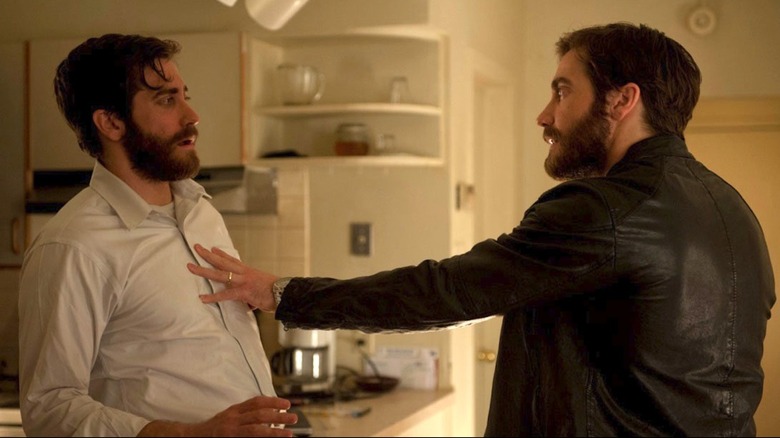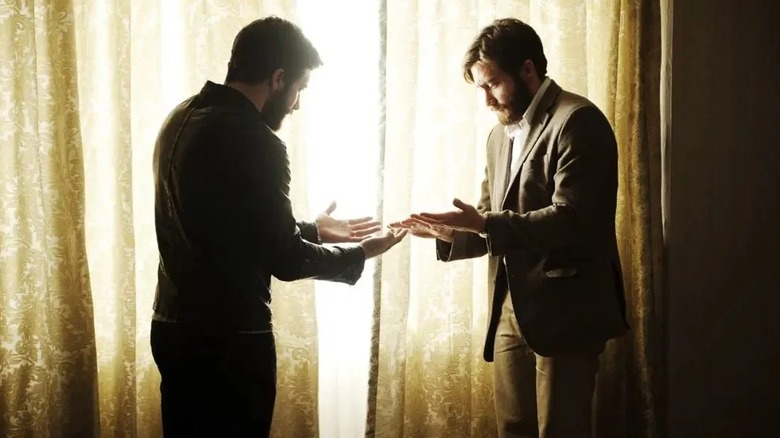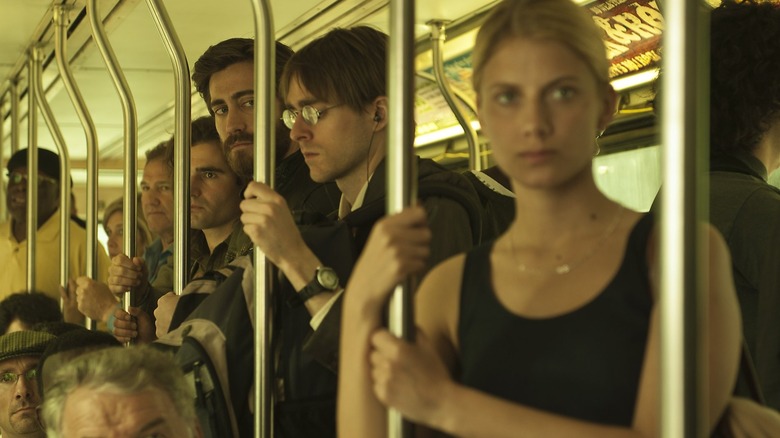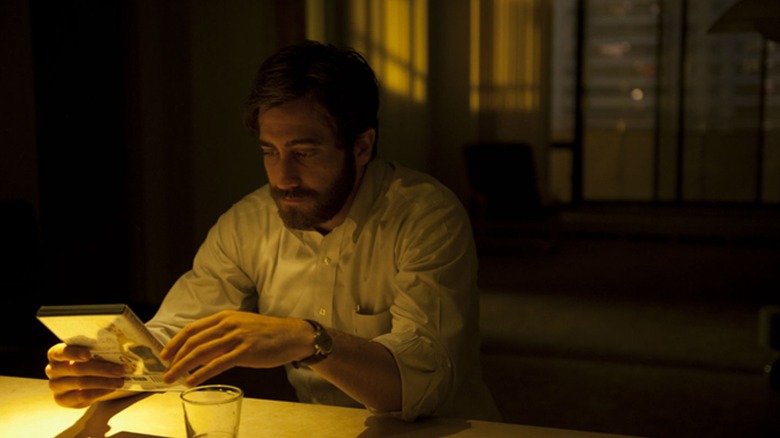The Deeper Meaning Of Denis Villeneuve's Enemy, Explained
This post contains spoilers for "Enemy."
"It was Hegel that said that all the greatest world events happen twice, and then Karl Marx added: the first time it was a tragedy, the second time it was a farce," says history professor Adam Bell (Jake Gyllenhaal) during a lecture session when he's first introduced in "Enemy." While these words seem innocuous with respect to untangling the complex web of themes in Denis Villeneuve's 2014 film, they're actually the key to the central mystery that grips the dual protagonists. Viewing "Enemy" through a singular lens might not give us all the answers — or satisfactory ones, for that matter — so let us tackle some of the biggest questions that seem to confound viewers once the credits roll.
To offer a brief, yet superficial recap: Adam, who seems discontent with his life's numbing monotony, stumbles upon a film featuring someone who looks exactly like him. This actor, Anthony (also Gyllenhaal), is less a lookalike and more a true double, with whom Adam becomes increasingly obsessed. The severity of this doppelgänger situation is intensified after the two meet and realize that their personalities could not be more different. While Adam engages with others politely and seems weighed down by the burden of existence, Anthony carries himself with an arrogant self-assurance that verges on impudence. Disturbing spider imagery weaves their disparate lives together with urgency, until one of the doubles dies in an accident, leaving the other with the rare opportunity of starting afresh. Unfortunately, this opportunity is a missed one, as history is bound to repeat itself.
While discussing the film's dense themes, Villeneuve told the Hollywood Reporter that "Enemy" is deliberately structured like a "spiral." Let's take a closer look at these dizzying narrative shapes.
Adam and Anthony are two halves of a whole in Enemy
"Enemy" is loosely based on José Saramago's 2002 novel "The Double," which dives into the unutterable horror of becoming aware of a mirrored self that is identical yet distinctly different, leading to a crisis strong enough to uproot the laws of reality. Doubles rarely find a way to peacefully co-exist; the laws of self-preservation dictate that only one can remain, lest the chaos descends into something unfathomably Kafkaesque. "Enemy" sets up this tension by emphasizing the vast differences between Adam and Anthony. One is mired in existential malaise even before he meets his identical twin, and the other maintains his confident, caustic toxicity even after discovering the truth. Anthony's wife, Helen (Sarah Gadon) is distressed after learning about Adam, amidst tensions over Anthony's repeated infidelities even while she is pregnant. When Adam pretends to be his double and approaches Helen, she can see right through him and seems to prefer the gentler, kinder version of her husband.
However, "Enemy" is not about identical twins, but a schism in the subconscious, where two warring selves fail to remain in control of their innate impulses. Every visual and subtextual clue points to the fact that Adam and Anthony are the same person, fighting for dominance over a singular existence that gets divided into two. Let's keep the words of his mother (played by Isabella Rossellini) in mind: at first, she points out Adam's lack of control over his life, underlining his unkempt appearance and general dissatisfaction, but later, she alludes to the same dissatisfaction in a different light. She talks about him giving up on his dreams of becoming an actor, and how he's discontent despite having a respectable job as a history professor. But what does this mean?
Enemy is about the deep fear of commitment
For a subconscious double to exist, it has to be born from the primary self. In this case, failed actor turned history professor Adam is the primary self, who is married to Helen and feels shackled by traditional monogamy and the mundane nature of his profession. As Helen makes clear at several points, Adam has been unfaithful, and this concentrated desire for freedom and lack of commitment compounds into a double: Anthony, the idealized version, the confident, successful actor who commits adultery at underground clubs without restraint or remorse. Although Adam's profession could be a fulfilling one, it is not his passion. After all, being an educator comes with responsibilities, moral restraint, and a sense of commitment to the cause. As he's not committed to this way of life, even such a respectable job leaves him feeling hollow, the thrills of a would-be-acting career haunting him forever.
Anthony is a culmination of the most egotistical suppressed desires that Adam harbors. It's his mind's attempt to distance itself from the subconscious. Adam is not introduced as a married individual, as he spends most of his time with his girlfriend Mary (Mélanie Laurent), but their relationship is defined only by sexual intimacy. Adam does not cheat on Mary or covet other women, but the married Anthony does so rather freely. This implies that Adam wants both: to be married to a doting wife who is pregnant with his child, while also being free to pursue other women without being vilified for it. He views marriage as a trap, like a spider web luring in prey, but cannot resist the lull of stability as a safety net.
The spiders denote fear, but also Adam's view of women
Arachnids crawl all over the story of "Enemy," towering over giant buildings or cowering in fear. A blink-and-you-miss-it reference to a poster for "The Attack of the 50 Foot Woman" links the spider imagery to Adam's fear of women. Well, not women per se, but rather what a committed relationship entails — which also explains why we see a huge tarantula about to be crushed under a heel in the opening club scene. The fresh set of club keys handed over to Adam signifies this latent desire to crush the chains of monogamy and commitment in favor of unchecked adultery. Yet we never see the spider being crushed, as Adam is unable to squash his contrarian impulses or stick to one ethical code. He's doomed to flit between the two until one of these warring selves is killed.
The death of the double, Anthony, should have marked the death of those adulterous impulses that were rooted in fear. After all, Mary dies with Anthony in the crash, their double death signifying Adam's subconscious attempt to end these relationships and return to his wife. This almost happens when Adam and Helen engage in tender intercourse. However, the club keys, which are a symbol of a hedonistic life shrouded in duplicitous anonymity, snap Adam out of this hard-earned salvation. He falls back into the old patterns even after his double is destroyed, embracing his fears and desires as himself ... which feels even bleaker than the concept of a subconscious doppelgänger indulging in excesses to absolve the primary self of guilt.
The ending, where Adam views Helen as a cowering spider instead of a macabre threat, spells doom. He has accepted his worst impulses, and what terrified him before, only fills him with resigned indifference now.
Details you might have missed in Enemy
-
When Adam goes to the video store to rent the film, the song playing in the background is "The Cheater" by Bob Kuban & The In Men, which talks about the ugliness of adultery and the tragic rejection of love in favor of something hollow and fleeting. This is one of the clues that tie Adam to Anthony and reveal his true heart.
-
The guard at the talent agency meets Adam (mistaking him for Anthony), and says he hasn't visited for six months. Helen is exactly six months pregnant when the events occur, hinting that Adam had to leave his dreams of being an actor behind in favor of a more stable job (like that of a college professor) to support his wife and child.
-
Personality differentiators between the two are parsed through the lens of lifestyle choices. Anthony always looks coolly confident and put together, while Adam looks disheveled and insecure. Anthony is also partial to organic blueberries, and when Adam tells his mother that he doesn't like blueberries, she quips, "Of course you do." This is yet another sign of their warring selves: the primary self is in denial of the double's preferences, despite them being the same. This psychological distancing is a coping mechanism to evade guilt, but discontentment haunts Adam and leads him straight to his double.
-
Circling back to the Hegel and Marx quote, it is clear that Adam is doomed to repeat history. His transgressions were deeply tragic the first time, as this was a man running away from his fears/anxieties surrounding commitment while chasing an idealized, egotistic self. The second time, however, is farcical, as growth and change are rejected without thought at the first sign of temptation.




